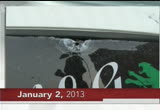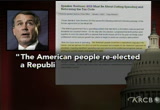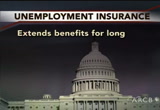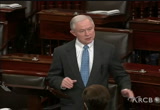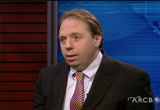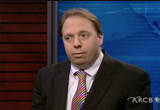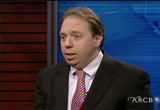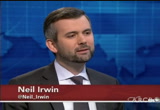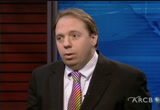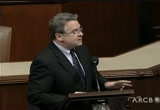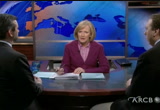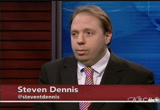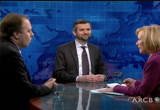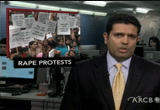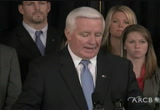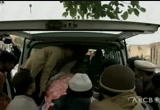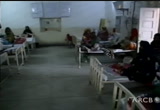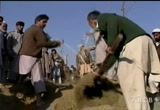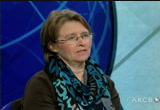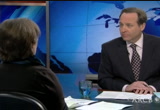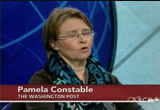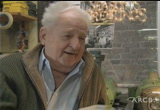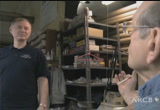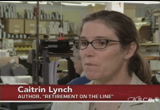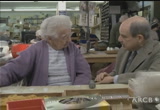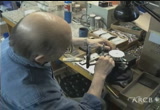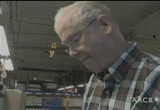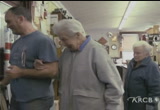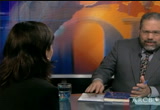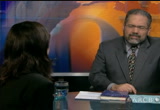tv PBS News Hour PBS January 2, 2013 5:30pm-6:30pm PST
5:31 pm
captioning sponsored by macneil/lehrer productions >> brown: congress stepped back from the brink of financial turmoil, at least for now, after the house passed a tax plan late last night and sent it to president obama. good evening, i'm jeffrey brown. >> woodruff: and i'm judy woodruff. on the "newshour" tonight, we look at how the vote came about and sort through some of the political consequences as a result of wt's in the bill and what's not. >> brown: then, new killings in pakistan, we look at the uptick in violence against aid workers and women teachers with "washington post" foreign affairs reporter pam constable. >> woodruff: paul solman takes us inside a company that turns a profit by employing an unusual
5:32 pm
workforce. >> a massachusetts manufacturing firm founded in 1932 where the median age is 74 and rosa finnegan over there, is 100. >> brown: and ray suarez talks with journalist and author claudia kolker about what she calls "the immigrant advantage." >> i began to ask foreign-born people what i call the question: what's the smartest thing that people did in your home country that you want to hang on to while you're here and the rest of us ought to copy? >> brown: that's all ahead on tonight's "newshour." >> major funding for the pbs newshour has been provided by: >> and with the ongoing support of these institutions and foundations.
5:33 pm
and... >> this program was made possible by the corporation for public broadcasting. and by contributions to your pbs station from viewers like you. thank you. >> woodruff: while much of the country kicked off the new year by going back to work today, washington said its goodbyes to the 112th congress, after a late night of final suspense on the fiscal cliff legislation. it gave the president much of what he wanted on taxes, and left republicans sharply divided. for president obama, the end-- for now-- of the washington budget drama, meant returning to hawaii today to resume his holiday vacation. but last night, before leaving, he welcomed house approval of the fiscal cliff bill. >> a central promise of my campaign for president was to
5:34 pm
change the tax code that was too skewed towards the wealthy at the expense of working middle- class americans. tonight, we've done that. >> reporter: the final vote in the house was 257 to 167 on a bill the senate had already approved, it capped days of intense negotiations. the provisions will affect nearly all taxpayers. for individuals making at least $400,000 and couples making $450,000-- income tax rates will go up-- from the current 35% to more than 39%. for that same group, dividend and capital gains taxes will also rise to 20%, from 15%. and all income groups get hit by the expiration of a payroll tax break. it's increasing two percentage points to 6.2% on the first $113,000 of income. ultimately, though, the vast majority of americans get to
5:35 pm
keep their bush-era income tax cuts, contributing another $4 trillion to thdeficit over ten years. republicans made a late push for offsetting spending cuts. when they failed to get them, 151 g.o.p. lawmakers voted against the measure. including congressman darrell issa of california. >> i cannot believe this tax cut will be followed by the spending cuts to offset any part of the three-- sorry, four trillion dollars we're putting on the backs of future generations. >> reporter: house speaker john boehner was among the 85 republicans who voted fo the bill. but in a statement, he promised to focus on a future deal that does cut spending. he said, "the american people re-elected a republican majority in the house, and we will use it in 2013 to hold the president accountable for the balanced approach he promised." many of the other republicans who voted "yes" were committee
5:36 pm
chairmen, retiring lawmakers or members who lost their seats in the november elections. congressman dave camp of michigan chairs the ways and means committee. >> republicans and the american people are getting something really important-- permanent tax relief. as big as that is-- and it's only the first step when it comes to taxes, this legislation settles the level of revenue we should bring in. >> reporter: beyond the income tax provisions, the bill also reinstates clinton-era limits on exemptions and deductions for higher-income americans. and tax rates will rise from 35% to 40% for estates worth $5 million or more. congress also agreed to extend unemployment insurance for the long-term jobless, for another year. most democrats had wanted more, but nearly all voted for the bill. >> this legislation breaks the
5:37 pm
iron barrier that for far too long has prevented additional tax revenues from the very wealthiest. >> woodruff: in the senate, the bill had sailed to overwhelming, bipartisan approval, early on new year's morning. today, majority leader harry reid summed up. >> it was a piece of legislation that we weren't all elated about, but it moved the ball forward. we have so many more hard decisions to make in the year >> this is not the way to run the senate! >> reporter: but republican jeff sessions of alabama warned that congress can't go on transacting its business this way. >> we are really too often using midnight hour votes on the eve of a crisis to ram through big historic legislation that has >> woodruff: the president is expected to sign the bill, but there was no word on when he will do so.
5:38 pm
to walk through how we got here, and how the compromise deal will affect most americans, we talk with two journalists who have closely followed each development. steven dennis is a reporter for "roll call" who covers the nexis between congress and the white house. neil irwin covers economics and fiscal policy for the "washington post." it's great to have you both with us. >> great to be here. >> woodruff: before we talk some more about what's in the bill, steven dennis, let's talk first about how we got to this high-drama, last-minute, new year's eve/new year's day. how did it come down to this? >> it was really a couple of years in the making. un, we had the tea party sweep in to power a couple of years ago. they wanted spending cuts for the last two years, and they really wanted to take on the big entitlement programs-- medicare, social security, medicaid-- and they've been basically unable to do it. and here we are at the very end, you know, about to close out this congress, and they were presented with a bill that they saws tax increase that they
5:39 pm
didn't want to vote for, alongside no real spending cut. that was know-- that was a bridge too far for a lot of these republicans who have been wanting that big deal, the big spending cuts for two years and have been unable to really get them. >> woodruff: but even in the days leading up to this, was there a chance that the president, speaker boehner could have come up with something bigger? >> well, part of the problem is a lot of these folks who voted no and wanted, you know, the spending cuts, they kept undercutting the speake you know, the speaker kept trying to come up with a grand bargain and work out something with the president, and every time he tried to go out and offer something on revenues, his own conference would start sniping behind his back. and, you know, a coupleuf weeks ago, he pulled out from those talks again, tried to go his own way, and his own folks basically torpedoed his plan b, and basically at that point, it was up to mitch mcconnell and
5:40 pm
ultimately vice president joe bide tone try to cobble affect something. and they did. >> woodruff: in the end you had overwhelming support in the senate but last night in the house, it passed, big margin, but most republicans voted against it. >> yeah, and, you know, a similar thing happened on tarp for 2008. >> woodruff: the troubled asset-- >> that's right. the wall street bailout, something very similar happened, where john boehner who was then the minority leader said, "hey, we need vote for this and save the economy." most republicans voted no, and it went down. this time around, it passed. but still, it's something that passed overwhelmingly in the senate. the use right nownd house republicans are really having a roft internal turmoil as well within their leadership ranks. it's not very often that you see the number two, the majority leader cantor voting against something the speaker wants. the whip voted no. paul ryan voted yes at the end.
5:41 pm
so they are very split on at least this tax bill, and they're going to have a lot of, you know, soul-searching to do about the next cliff in a couple of months. >> woodruff: setting politics aside for a minute, anne neal, let's talk about what's in the bill. one part of this that will affect everybody and that was actually not even in the bill, and that was the fact the payroll tax holiday, or payroll tax break is ending. >> this was a stimulus measure introduced at the start of 2011. it has been with us for two years now. it's a two percentage point cut in payroll taxes that affects every working american pain typical work who are makes $50,000, that's $1,000 a year in more after-tax income they have because of this holiday, but it was temporary. it was designed to be temporary beep always knew it would go away eventually. and the question was would it be extended for one more year? would there be offsetting stimulus measures to help the economy get along without it? neither of those things that
5:42 pm
happened. this thing has gone way as scheduled so when the people get the first paycheck in 2013, it will be a little less, a little lighter. >> woodruff: let's talk about the income tax hike. the president wanted int on income over $250,000. tended up on over $450,000 for families. what percentage of americans are actually going to be hit? >> a pretty small sliver, 0.7% affect bide the income tax increase. there are other aspects to this deal that increases taxes on americans who make over $250,000, more like 2% of the population. but the major headline out of this is the income tax. and as you say, we go back to clinton-era rates for households making over $4 50,000 a year. that was a bit of a compromise. the president wanted 250. the congressional leaders on the reblic side, anyway, wanted no increase at all or at least a much higher level and that's where the negotiation ended up. >> woodruff: and you also have
5:43 pm
an increase in the estate tax but on the wellier folks than the white house originally wanted. >> right. this is another thing republicans were fighting hard for thisn this negotiation and that they won on, to a degree. we're going to see an estate tax that has been in flux for the last several years, since the original bush tax cuts, 2001-2003-- it's been uncareer what the estate tax will be from year to year. it's been hard to do planning. we may have stability on what the estate tax looks like now. >> woodruff: in the meantime, neil, the vast majority of americans will continue to enjoy the so-called bush-era tax cuts. those will stay and they've been made permanent. >> that's right. this is-- in a way, this is-- this vote yesterday was a big win for george w. bush. if you look at his first achievement as president, first in 2001, then in 2003, it was cutting income tax rates on almost all americans, including the middle class, including the upper class, while they've been phased out for the very urch end e income spectrum, for all
5:44 pm
those lower, middle, upper middle income taxpayers thoashz bush era tax rates are now frozen forever. they can be changed by congress every time but they no longer have an expiration date. >> woodruff: steven dennis ydid that happen? we know the white house didn't want that originally. >> this is about leverage. mitch mcconnell was looking at the long run here and saying, okay, if these tax cuts keep expiring, thel keep being used as leverage against us because we'll face automatic tax increases which we really don't want as republicans. by taking that off the table, making them permanent, he gave the president a lot of what he wanted in this deal, which angered some of folks in his base, but he got a permanent solution. what does that mean? that means next year, when they're arguing over spending, if they don't get what they want, something happens to the spending, they don't have their crown jewel, the tax cuts, potentially on the chopping block over year. that's a big deal. and they are already coming out
5:45 pm
and saying today and for the next couple months, look, you got your tax increases. now giv us the spending cuts. we don't want to give any more revenue. so it's going to be much harder for the president-- this was his leverage moment to try to extract some things and, you know, this might be all he gets for the next period of time here as far as revenue. >> woodruff: i'm going to ask of two of you to stay with us for a minute while we look at another part of what happened last night, and that was after the vote on the fiscal cliff, there was another, a different spending spat that divided the republican party. house republican leaders refused to take up an aid package for vsms hurricane sandy which the president called for and the senate had approved elderlier. from the moment the house convened today, bi-partisan anger filled the chamber. lawmakers from new york, new jersey and connecticut said the failure to vote on hurricane "sandy" aid was a betrayal. >> we cannot believe that this
5:46 pm
cruel knife in the back was delivered to our region. >> they said you are on your own. my friends, our people cannot be on their own. >> woodruff: the senate approved a $60 billion storm recovery measure last friday. house leaders had been considering a pared-down version, when speaker john boehner pulled the bill last night. a number of republicans had insisted on offsetting spending cuts. but boehner's decision was lambasted by new jersey's republican governor chris christie, who charged storm victims have already waited too long. >> america deserves better than just another example of a government that has forgotten who they are there to serve a why. 66 days and counting. shame on you. shame on congress. it is why the american people hate congress. it's why they hate them.
5:47 pm
>> woodruff: new york city mayor and president obama pressed for action in a written statement. it read, in part: "i urge republicans in the house of representatives to bring this important request to a vote today, and pass it without delay for our fellow americans." this afternoon, speaker boehner met with the new york and new jersey delegations. and congressman king of new york emerged later to say they'd gotten what they want after all. >> $9 billion on flood insurance this friday will be voted on. and then on january 15, the first full legislative day, will be the additional $51 billion will be voted on. and that will come to a total of 60, which the total was for the bill that was supposed to be voted on this week. >> woodruff: the votes will be taken by the new congress, that's due to be sworn in tomorrow. still here with us are steven dennis of roll call and neil irwin of the "washington post." and, steven, governor christie was very angry, congressman
5:48 pm
king, others from the northeast very angry. what happened? >> it was amazing to see almost a melted down on the house floor last night with all of these members, republican members, coming to the house-- floor and just ripping into their leadership saying they felt they had been lied to, that they were going to get this before they went home. and then it went poof. and basically, our understanding is the speaker basically decided, look, we just had this big fight over the fiscal cliff. everybody is angry about the lack of spending cuts and then we're going to have a bill that spends $30 billion or $60 billion, depending which bill they ended up bringing to the floor, i think that was something that, you know, ended up being a p.r. nightmare for them to have hour after hour, whether it be chris christie or pete king or whoever going on the news and saying, "hey, don't give request money on the republican party if you're in new york or new jersey." and within a day, they backpedaled and, you know, this thing is going to start on
5:49 pm
friday. they're going to get $10 billion-- >> woodruff: changed his mind very quickly. they are going to apparently get this money. >> yeah, but it does show a difference between the ( party today and where they were during katrina. they passed katrina aid, a big package, in a week. un, this new party needs-- you know, they want those cuts. they're not happy with just spends tens of billions of dollars without anything offsetting it? >> woodruff: neil irwin, how much money are we talk about here for hurricane sandy. the number was $stict of 60 billion. it sounds like a lot of money-- >> it's $60 billion, it's a lot of money by any measure. government spends $2 trillion a year. emergency spendin spending is o. it doesn't change the long-term picture by much. it's not a huge number in the scheme of things but it gets back to the ideological issue, okay, when something bad happens and we have a devastating storm,
5:50 pm
is the government going to write a check and help that area and help people rebuild and spend whatevert takes to do, that or are we going to have a long, contentious legislative debate to figure out how to offset that spending elsewhere? that debate came up it at an inopportune time for a republican party already freyed in a lot of ways. >> woodruff: i know a lot of republicans were saying this money should have been offset with spending cuts and it wasn't. it won't be, i guess, is the view right now. >> it appears that way. i think the situation is still in flux even as we teak spooek and we'll see how it shakes out. >> woodruff: that's one of the things that didn't get done. it will be reversed. but there were other things, neil, that people are looking at the overall impact of this legislation and saying, wait a minute. the deficit reduction is what? we were originally talking at the $4 trillion level. where does it end up? >> it depends how you count. whether you count assuming the entire bush tax cuts had stayed in place and there had been no change or if your baseline is
5:51 pm
instead the expiration of those cuts that had been envisioned, either way you slight sloois it this is night huge deficit reduction. this is really about the president getting his way to a degree on taxes, and the republicans getting those bush tuctz locked in and getting some other things they like to see. this is not changing in a major way-- this is not the long-term deficit reduction bill the nation will need. this is the long-term tax reform bill we might need. this is fixing a lot of the long-term problems we face, this is a deal to get us to another day. >> woodruff: steven, that means we-- wean there are other fights coming. they put off the so-called sequester voarkts the automatic croos the board spending cuts. that's going to come up pretty quickly. >> thing deal makes it harder to do the next deal, harder to do the big deal. it has taken the big carrots, those are out the door, and republicans are going to be much less likely on additional
5:52 pm
revenue. and you have this debt ceiling. you have a debt ceiling looming in a couple months. john boehner has something called "the boehner rule" which i think will become the new fiscal cliff key word. you want $1 in deficit increase, i want $1 in spending cuts. and the president is saying i'm not going to negotiate at all. so & that strikes in two months. un, that's-- somebody's going to have to give on that, and, you know, it could get really ugly really fast. >> woodruff: neil irwin, if you're looking at this economy right now and looking at this legislation, does it have an impact on the american economy ounemployment? >> so there are some mild negatives that come from the higher taxes, especially the payroll tax holiday we talked beven higher income tax rates ray negative for growth. that said, this economy has been plugging along. what steve is talking about are some really dangerous things.
5:53 pm
we're heading into another standoff over the debt ceiling. we all remember how that worked out in august 2011. it hurt business confidence. it floated the possibility of a federal government default. we had a credit downgrade of the u.s. credit rating. those were all things that undermind business confidence and made 2011 a worse year than it might have been. the next round of brinksmanship of negotiations we might see that again. let's hope this is a crisper series of negotiations that aren't quite as scary for business and the economy. >> woodruff: in a word, steve own, is that something members are prepared to do? >> i see a lot more brinksmanship. i think it could get very, vur ugly. we might get-- thaeft theor they it's going to take the markets freaking out again before they come up with another deal. >> woodruff: we'll only hope that's not going to happen. steven dennis, neil irwin, we thank you both. >> brown: and there's more on all this online, including a way for you to see how your state's congressional delegation voted.
5:54 pm
>> brown: and still to come on the "newshour": the targeting of pakistan aid workers; the value of seniors in the workforce and the "immigrant advantage." but first, the other news of the day. here's hari sreenivasan. >> sreenivasan: wall street started the year with a bang, as the fiscal cliff deal put an end to fears of sweeping tax hikes and spending cuts. the dow jones industrial average surged 308 points to close at 13,412-- its biggest gain in a year. the nasdaq rose more than 92 points to close at 3,112. the civil war in syria yielded grim new numbers today. the u.n. human rights office reported the number of dead has risen sharply over previous figures. we have a report narrated by alex thomson of "independent television news." some of the images may be disturbing. >> truly shocking. the words of the u.n. officials. syrians need no persuading of
5:55 pm
that. today, at least another 30 or so added to the death list. somebody fired into the petrol station. they'd have none here for four days. news was spreading fast that respliefs happening and the place was crowded. vulnerable human bodies... metal, concrete, fire, and high explosive. we can only show you a little of what took place here government jets were filmed apparently bombing suburbs as they do almost every day.
5:56 pm
activists blamed the government forces for the petrol station attack. but with the government restricting access to outside journalists, there's really no way of verifying who did what or why. it is the story of the syrian civil war. just last week, the same united nations left more or less wringing its hands, its diplomats saying talking is the only way out of this bleed stalemate but nobody wants to talk seriously. neither side wants to talk directly to the other at all right now. >> sreenivasan: in another development, the family of american journalist james foley announced he's missing in syria. he was seized by gunmen, near the turkish border, in late nomber. in india, several thousand women staged a new protest over the gang-rape of a 23-year-old medical student, who died of her injuries. the protesters held a silent march in new delhi, to the gandhi memorial. they called for reforms in the
5:57 pm
justice system and a national focus on sexual violence. the six suspects in the gang rape and murder are to be formally charged tomorrow. the u.s. coast guard kept close watch today on a grounded oil drilling barge in the gulf of alaska. the royal dutch shell barge was being towed monday night when it broke loose in stormy conditions. since then, rough seas have hampered efforts to board the drilling vessel to assess any damage. but a federal response coordinator at the scene said there are no signs of a fuel leak. pennsylvania governor tom corbett sued today to overturn n.c.a.a. sanctions against penn state university. the sanctions followed the scandal over sexual abuse of children by a former penn state football coach, jerry sandusky. he's now in prison. corbett asked a federal court to throw out all of the penalties against the school, including a $60 million fine, a four-year ban on bowl games and a loss of athletic scholarships. >> a handl of top n.a.a officials simply inserted themselves into an issue they had no authority to police under their own bylaws, and one that was clearly being handled by the justice system.
5:58 pm
they used penn state's tarnished public image as an opportunity to force the university to endure harsh, unjustified, and unprecedented punishments. >> sreenivasan: in response, the n.c.a.a. said the lawsuit is an affront to sandusky's victims and has no merit. those are some of the day's major stories. now, back to jeff. >> brown: in pakistan toy, hundreds turned out to bury seven aid workers who were killed yesterday. it happened in the northwest part of the country, some 75 miles from the capital islamabad. we begin with a report narrated by harry smith of "independent television news." >> reporter: she died because she was a woman and because she believed in education and health care. one of seven teachers and aid workers shot dead as they left the school and health center where they worked. the gunman who ambushed them spared her son who was forced out of the vehicle they were traveling in before they then opened fire. his father told how he learned of the atta.
5:59 pm
>> ( translated ): i was in the fuel station when i received a call that somebody had opened fire on their vehicle. i left everything and rushed towards the spot. as i reached there, i saw their dead bodies were inside the vehicle. and my son was sitting with someone. the gunman pulled him out and opened fire on them. >> reporter: the father of another of the victims said they were all well aware of the dangers they faced. >> ( translated ): i told her many times at home to be careful, as we are poor people. and take care of yourself at all times. always in response, she said, "father, i am not guilty. no one can harm me." >> reporter: this is the latest in a series of deadly attacks on aid workers and teachers. pakistan is one of only three countries left in the world where diseases such as polio and measles are endemic.
6:00 pm
immunizations are treated with suspicion. the man in charge of the team in the latest outrage said the whole community has been shocked. >> we are aware of such incidents, but the place where we were operating, the community to whom we are serving so we feel we are secure. >> reporter: suspicions about the motives of aid teams have been fueled by revelations about the c.i.a., which set up a vaccination program in abbottabad. that helped them gather d.n.a. evidence to track down osama bin laden and kill him. that operation has been criticized by aid agencies as it puts them in the firing line. apart from those who have now lost their lives, thousands of children suffering from normally curable diseases could also end up as the victims. >> brown: joining me now is pamela constable, a longtime reporter on pakistan for the
6:01 pm
"washington post." her latest book is "playing with fire: pakistan at war with itself." pam, what is known at this point about who is behind this and why these peems would be targeted? >> well, at this point, i don't think any group has taken responsibility for this particular attack. but we've been seeing a series of attacks against health workers, education workers, particularly women who are going out in these areas, some karachi, but mostly in the northwest tribal areas, and trying to do what we would call health education social work. and the groups that have been consistently-- and i would say defiantly-- outspoken against these groups are loosely termed as the taliban but they are a number of different religious right leaders from that area. >> brown: who are seeing, as we heard in that report, a western plot behind these efforts. >> they see western plots behind everything. and it's particularly sad that they're seeing western plots behind very expense and i have well-meaning efforts to actually improve the health and well-being of the population. the problem is that sometimes they're right.
6:02 pm
as in the case that the film clip mentioned of-- >> brown: explain that. that was the cia? >> and during the effort to track bin laden in pakistan, there was a doctor who was hired, a pack taken doctor who was hired to go out and do health vaccination surveys. i believe it was for hepatitis. i'm not sure. and he turned on the to be in fact gathering information for american forces looking for bin laden. of course of course that played very largely into the hands of those who do see a western plot behind everything. >> brown: well, that aside, i mean, the groups that are doing this, the legitimate work, who are they? i mean are, they mostly local groups? and are they local workers? >> they're almost all, i would say 99%, are local workers. the great majority of them are local groups. but they also get much of their funding, if not mt of their funding from international atlantic cities, the united nations, u.s.a.i.d., other
6:03 pm
foreign countries supply the support. and i believe as a result of another term attack that dmrd december against polio vaccine workers that the u.n. has decide stop its polo vaccination campaign in pakistan. it's truly tragic. >> brown: as you said, many of the work experts targets, therefore, are women. >> absolutely. and if we go back to the case of nancy youssef who was also mentioned in your clip, that was particularly heinous crime, although, fortunately, she survived, and many of these women have not. these groups, these militant groups have said very clearly and again very defiantry, we do not think women should be out in public, not entering homes, not doing public service work, not going to school, not going to the office. they don't want women out glowr where is the government in this? do they have the ability to protect aid workers. do they have the will to protect them? >> they certainly have the ability. i don't really think they have enough will. i think it's been very difficult, particularly for civilianuthorities, to come
6:04 pm
out as strongly as they might like to against these attacks. they are still very concerned about the growing political power of the religious right in pakistan, and i think that has kept them in a number of cases from coming out and saying tore doing what is right. >> brown: to the extent they will just back off altogether. >> yes. obviously, they have police, they have army, they have people that can go in thees places and do a better job of trying to protect individual operations and schools and clinics, but it takes more than that. it takes leadership from the very top of the both the ilitary and political establishment to say this simply is not acceptable. >> brown: what about at the local level? hundreds came out, and it-- >> peered in this case the local group had local support. >> absolutely. i'm sure that's right. most of these groups go out-- they canvas, first. they're not going to go into enemy territory, they're going to cooperate with local village elders in each case before they go on their program. the problem is not the local population. most pab stannies realize these
6:05 pm
are good things being done. >> brown: can we tell at this point how much the fr or the reality of these killings are having, the impact desired by the perpetrators -- that is, the aid work is either stopping or lessening? >> it's hard ton over the long run. as i mentioned before, i think the u.n. is really pulling back on some its vaccine campaigns and others. there have been a number of it aid projects shut down or temporarily suspended in those parts of pakistan. you know, i do think it's very a chilling effect to a certain extent, and i think it's going to continue as long as people are intimidated. you know, people are going to stop allowing their relatives from going out and taking that sort of risk. >> brown: they're particularly vulnerable in they're locals. all right, pam constable, thanks so much. >> you're very welcome. >> woodruff: now, a massachusetts company that has found the road to profitability lies with an underemployed group of workers.
6:06 pm
economics correspondent paul solman reports on this rare hiring policy. it's part of his ongoing reporting, "making sense of financial news." >> reporter: since losing her husband 16 years ago, retired waitress rosa finnegan has been coming to work at vita needle in needham, massachusetts. >> i can still walk up the stairs as long as i have a little support. i don't want to fall backwards. >> reporter: no surprise that at 100, rosa is the oldest worker at this needle and tube manufacturer. the next oldest, bill ferson is just 94. >> i'm in! >> so i go home, i said to my wife, "i think i got a part time job." "oh, good," she said, "get you out of my hair." >> reporter: in fact, the average age of the 48 workers at vita needle is 74. >> i was only going to come for five or six months, something like that. i've been here 24 years.
6:07 pm
i'm never going to quit working. >> reporter: now the data on workers over 55 is that they're unemployed far longer than younger ones. the anecdata: that age discrimination abounds. but age discrimination here means: the older the better! >> attention to detail is excellent, attention to quality, loyalty. >> reporter: there are a host of reasons, says company president fred hartman, for employing the elderly. >> our turnover, believe it or not, is very low. we probably bury more people than have people leave in a given year. >> reporter: hartman's family has owned vita needle for 80 years. but the company he took over in the 1980s was struggling. >> at the time all we could find was people that had been downsized, laid f, tt re senior citizens and we could only afford part-time help at
6:08 pm
the time, so that's who we hired. then the epiphany and the light bulb went on and said, "this is a good arrangement for everybody." >> reporter: vita needle says it's made record profits 18 of the last 20 years, thanks in large part to its geriatric workforce, which works part-time for $10 to $20 per hour. >> mr. hartman's been very good to me. how many places would keep a man my age? even hire me? >> reporter: how much do you make? >> i'll never get rich here, let me put it that way. >> reporter: ferson, whose wall art was put up by a former colleague, he says, won't get rich, but he does have total flex-time. anthropologist caitrin lynch. >> it's very surprising that a manufacturing facility can be set up in a way that's very flexible. so you'll hear from workers here who say, "i can have it all. i can work during my retirement, but i can also clock out at 2:00 and babysit." >> reporter: lynch herself,
6:09 pm
worked here for a summer while researching a book on vita needle, retirement on the line. >> people would acknowledge that this wouldn't have worked for them at an earlier stage of life, when they had children they were raising; saving for college; paying off mortgages; it wouldn't have worked then. >> reporter: but it works now. employees are cross-trained so they can pitch in where needed, packing needles with syringes for instance. this is like a syringe for a cow or something, i mean that's huge. >> this isn't huge. >> reporr: well, i sure as hell hope nobody is going to put that in me. >> you should see the undertaker needles. >> reporter: the undertaker needles? no, i don't think i want to see them thank you. >> they're much larger than these. >> reporter: but at age 100, why not kick back and smell the roses and every other flower in the garden? >> well, i think coming here keeps me going as something to look forward to and everybody greets each other in the
6:10 pm
morning, "how'd you sleep, you tell each other your aches and pains and that means a lot. >> someone landed on him going into the end zone. >> reporter: break time in what's called the club house, where the guys gather to gab and nosh before it's back to the grind. >> well, we've got to go make money for fred! >> absolutely. >> my friends are all underground. these are all new friends. i got a place to come, people to talk to. i'm not alone. i keep my upstairs going. >> reporter: do you think that this job really keeps you in mental shape, or sharp? >> let me put it this way, if it wasn't for this job, i might be six feet under. a lot of people a lot younger than me are in tough shape-- i know, i've seen them. i don't want to be like that. >> oh! new chairs! >> i tried it out and they're going to have to get a different
6:11 pm
kind of a chair for me. >> reporter: camaraderie and flexibility are obvious reasons older folks like it here. >> they're writing songs of love, but not for me! >> reporter: but another reason is being of use. is work at this age then redemptive? "yes," says caitrin lynch. >> it's through the process of working, through knowing you're doing something productive that's contributing to a very successful business that people feel like there's still a reason for me to be here, be here in the world. we're in an american society, unfortunately, people feel invisible as they get older. >> reporter: and what's it like for a younger worker? 29-year-old a.j. coffey appreciates coworkers his grandparents age. >> they always show up for work. you don't have to worry about, someone called in today, like, kids my age, or younger. >> reporter: the company and its aged artisans have attracted attention near and far-- german and dutch filmmakers made documentaries about it. >> do you have these kind of cards over in germany?
6:12 pm
>> reporter: closer to home, lynch and long-toothed laborers like 83-year-old joe reddington give talks on the firm. >> joe, have you ever heard of the word retirement? >> i think about it when it gets bright in the morning and i have to get up. i think about it. then i say no! >> reporter: 76-year-old retired engineer bob omara has worked at vita needle for 11 years. >> retirement isn't death. it shouldn't be anyway. you've got all this investment in people's knowledge. why throw it away? >> reporter: some keep working because they don't have a choice. 78-year-old howard ring started here six years ago. >> i was doing it for the money. >> reporter: ring was laid off from his job as a mechanical engineer and had struggled to find other work. >> i felt awkward about leaving the house, because i didn't have
6:13 pm
a job. i was able to work, looking to work and there was nobody to hire me. i felt sort of ashamed. >> reporter: most of vita needle's press has been positive, though some wonder if the company hires the elderly as a costly act of kindness. nonsense, says fred hartman. >> we get it back in spades as far as the company is concerned with the loyalty, the effort that's put forward. perhaps our folks aren't as fast as some of the younger ones, but we have more than enough people so that we can ironically enough, be one of the fastest in our industry in responding to our customers requirements. >> reporter: an opposite critique: that because the older workers receive social security and medicare, the company is exploiting cheap labor, paying low wages while government picks up the tab for benefits. >> that's not true at all. we have young people that are 21 years old that work here. we pay competitive wages for our
6:14 pm
market and then on top of that have an annual profit sharing where if the company wins everybody wins. >> reporter: so you're offended by the question? >> i am. we don't pay full-time benefits to people that are part-time. our workforce, by in large is part-time, so we have more than enough help to cover our daily needs. >> reporter: but don't the workers sometimes feel exploited? we put the question to rosa finnegan. >> my goodness, there isn't-- you don't see anyone telling me, get going here. hurry up, you're not doing enough. you know, no one ever says that to you here. you work at your own pace. i think this is the most wonderful place on earth. that's the truth. ( laughter ) >> reporter: come on i mean, there's got to be some places better than this? >> maybe they have better restrooms, that's about it. ( laughter ) >> reporter: well, restrooms
6:15 pm
aside, this place certainly has its virtues. >> these things are very sharp. >> reporter: but as more and more americans approach finnegan's age, or hope to at any rate, could a quirky firm like vita needle actually serve as a model for others? >> i haven't found another manufacturing facility that with a median age of 74, but it is possible that there could be, you know, little parts of this lesson that help us to think in a new way about, you know, those 75-year-olds-- they're not useless. let's think about how to bring them in for the benefit of our company and for them. >> reporter: and why not, asks howard ring? >> look, the supreme court has got people over 80 in it and we don't think much about that, so why can't we do this with other people? >> reporter: well, nobody on the supreme court has made it to 100 yet. but if they did, would you have a problem with it? and who wouldn't want meaningful
6:16 pm
work in their 101st year of life, even if there weren't an elevator? >> woodruff: paul has an extended conversation with 100-year-old rosa finnegan. you can watch that on our website. >> brown: now, a fresh look at the immigrant experience and some surprising research on their health and ways of life in america. ray suarez has our book conversation. >> suarez: it's a phenomenon that stumped social scientists for years. hispanics in the u.s. are worse off than their white neighbors by almost every economic measures -- poverty rates, higher dropout rates, less access to health care. yet, they live longer, two years more than non-hispanic whites, nearly seven years more than african americans. other immigrant groups also seem
6:17 pm
to have better physical and mental health, especially in the first generation after moving here. in a new book journalist claudia kolker looks at how some of the customs imported by america's newcomers benefit those groups and could benefit others. it's called "the immigrant advantage left-hand cha we can learn from newcomers to america about help, happiness, and hope." claudia kolker, welcome. >> thank you so much. >> suarez: as we embark or seem to be embarking on another debate about immigration, what it's for, how much, how little, the rules we're going to live by, americans often ask, "why do we want these people here?" and "will they become american?" you do an audacious thick right off the top, which is challenge the reader to think if what we can learn from immigrants. tell us more about that. >> well, one of the big ideas in this book is that we already have many, many immigrants here, and while it is essential to
6:18 pm
understand and have a really sound policy for newcomers and for newcomers to come legally, the great majority of foreign-born people here are here legally. they are here. they have some extraordinary kills and practices and outcomes that i want, not only as a journalist to find out about, but i as a parent and as a citizen, i wanted some of those things. so that was the starting point for this bk is some of these successes that some ofs least-advantaged people in our culture right now have. >> suarez: a lot of these ways of life have to do with the very practical day-to-day skills of living-- childbirth, dating, courting, pooling money instead of going to banks, intergenerational living arrangements. some of it is stuff that americans used to do. >> absolutely. and that is-- that is really one of the keys. very little in here is exotic. these are some of the practices
6:19 pm
that made the united states what it is. and that we have forgotten and really forgotten fairly recently. we have thought that we haven't had need for them. >> suarez: give me some examples of what you saw. because you came into people's lives and watched their daily lives and tried to explain how this thing they do works. >> okay. and i'll tell you-- i also want to tell you a little bit about how i came to ask this question which is as a reporter. first i reported on the immigrants in my adopted hometown of houston. but then, because i know so many immigrants i began to ask more and more people what i called "the question." what's the smartest thing people did in your home country that you want to hang on to while you're here and the rest of us ought to copy? and everybody had an answer. and one of the most striking ones, one of the ones that really resonated to professional american women that i knew and many, many readers was a post-partum practice that some
6:20 pm
some form is really done in almost all of the world but is taken extremely seriously in very poor ral mexico, it sounds like 40 and quarantine and for because for 40 days after a baby is born, the resourcees, the tenderness, the care, the special foods, the rest all go to the new mother. the baby is taken care of and cuddled and cleaned, but it is the mother's health that is essential to take care of. and these are women who are very hard working and don't get pampered at other times in their lives. the entire family community knows the health, the emotional but really the physical health of the mother is essential to keep the rest of that family alive and thextreme they say go to are striking. in rural mexico, in chap ai interviewed people who came from chiapas toac on, ohio. they were working in fact reerkz in agriculture. in the first 40 days after a baby is born a woman may not touch a broom or dish cloth, and if she does, if she touches it,
6:21 pm
she is an irresponsible mother. >> suarez: do you get measurably better results from the children when-- >> from the children? >> suarez: right. when you have a baby, and you've given this time, this pampering, this attention, are you more likely to have a kid that's going to be healthier? are you yourself going to be healthier? >> to start off, this is anecdotal. these are folk traditions, okay, and they have not been much study. but it is true in the research that has been done-- which is limited -- it does seem that in many traditional communities, especially in latin america, where they have many, many problems and much tragedy, but post-partum depression is not one of the things they are familiar with. and i have heard this over and over. and i need to stress it's anecdotal, but the research that's theredoes suggest this. and in the united states, we have up too 15% or 20% of post-partum depression in this country. >> suarez: you take a look at school excellence and asian immigrants, and it seems to turn out-- surprise, surprise-- they
6:22 pm
just work harder than a lot of american kids and work differently. >> work differently and work smartly. here, again, one of the other ideaiz gleaned from this, these are practices that have been treasured for millennia in their home countries. actually, they work a lot of times better here in the united states. the stakes are not so high. in a country like south korea, the stakeses are soigh,here are only-- there's a limited number of colleges to get into that will allow you to move up socially and economically. we have a lot of very, very good colleges in the united states. but we want to get the best out of our public schools. and you work harder but also, asians come here-- many asians come here way toolbox of how to survive in their own school systems and it turns out to be very applicable to our school system. that's the key tulle of the practices here-- they had to translate beautifully to our system. and the thg they copied fg preemptive tutoring. in other words,itute org not when junior or missy is already
6:23 pm
having trouble in math. it's to get ahead. to always be a state police ahead. and-- upon a step ahead. and with a trusted adult who has less pressure because this person is tiewtsorring-- ideally a small group is probably better than one on one because the positive peer pressure is great, and also the confidence of going in and see and seeing that mater a second time. they are working harder no hard. >> suarez: the immigrant advantage. i want to continue our conversation on line but thanks for being with us. >> thank you. >> brown: you can watch an extended interview with claudia kolker online and read the seven lessons she says we can learn from immigrants. >> woodruff: finally tonight, we remember patti page. she was the best-selling female singer of the 1950s with hits
6:24 pm
like "how much is that doggie in the window." page died on new year's day, just five weeks away from being honored with a lifetime achievement award at the grammy's. here is page in 1955 performing another of her memorable songs, "tennessee waltz." ♪ i remember the night and the tennessee waltz ♪ now i know just how much i have lost ♪ yes, i lost my little darling the beautiful tennessee waltz
6:25 pm
>> woodruff: patti page was 85 years old. >> brown: again, the major developments of the day: the 112th congress wound down, and president obama returned to his hawaiian holiday, after the house gave final approval to the "fiscal cliff" bill late last night. wall street surged higher on news of the deal in washington. the dow industrials gained more than 300 points. and the u.n. sharply raised its estimate of the dead in syria's civil war to 60,000. hillary clinton was discharged from the hospital afterbeing treat forward a blood clot. how smart is congress? one retiring member shares his observations about former colleagues. hari sreenivasan has more. >> sreenivasan: in our ongoing series of congressional exit interviews, massachusetts representative barney frank spoke candidly with economics correspondent paul solman. watch an outtake on the making sense page. that and more is on our website newshour.pbs.org.
6:26 pm
jeff? >> brown: and that's the "newshour" for tonight. on thursday, we'll look at the legislative challenges ahead for the new congress. i'm jeffrey brown. >> woodruff: and i'm judy woodruff. we'll see you online and again here tomorrow evening. thank you and good night. >> major funding for the pbs newshour has been provided by: ♪ ♪ movg oueconomfor 160 years. bnsf, the engine that connects us.
6:27 pm
>> and with the ongoing support of these institutions and foundations. and... >> this program was made possible by the corporation for public broadcasting. and by contributions to your pbs station from viewers like you. thank you. captioning sponsored by mneilehrer productions captioned by media access group at wgbh access.wgbh.org
128 Views
IN COLLECTIONS
KRCB (PBS) Television Archive
Television Archive  Television Archive News Search Service
Television Archive News Search Service 
Uploaded by TV Archive on

 Live Music Archive
Live Music Archive Librivox Free Audio
Librivox Free Audio Metropolitan Museum
Metropolitan Museum Cleveland Museum of Art
Cleveland Museum of Art Internet Arcade
Internet Arcade Console Living Room
Console Living Room Books to Borrow
Books to Borrow Open Library
Open Library TV News
TV News Understanding 9/11
Understanding 9/11

